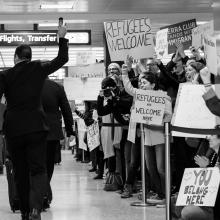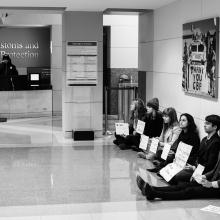executive order
Yet history repeats itself – leaders are sacrificing lives to ensure an "uninterrupted food supply." These meat and poultry plants, just like cotton fields once were, have been deemed "critical infrastructure" to the nation's economy.
Trump signed an executive order requiring immigrant families be detained together when they are caught entering the country illegally for as long as their criminal proceedings take. While that may end a policy that drew a rebuke from Pope Francis and everyone else from human rights advocates to business leaders, it may also mean immigrant children remain in custody indefinitely.
The White House said those working on the initiative will provide policy recommendations from faith-based and community programs on “more effective solutions to poverty” and inform the administration of “any failures of the executive branch to comply with religious liberty protections under law.”
"Work requirements do not create jobs; they instead create barriers to assistance for those who need them, oftentimes when their situation is most dire," House Democratic Whip Steny Hoyer (M.D.) and Rep. Barbara Lee (D-C.A.) said in a joint statement. "This executive order perpetuates false and racist stereotypes about certain groups supposedly taking advantage of government assistance."
Donald Trump thanked conservative Christians for their votes, and promised to protect their values in his first commencement address as president, at evangelical stronghold Liberty University.
“In America, we don’t worship government, we worship God,” he said to raucous applause at the graduation, at the nation’s largest Christian university, on March 13, in Lynchburg, Va.

Image via a katz/Shutterstock.com
As of May 5, according to the Boston Globe, 134 lawsuits have been brought against President Trump in federal court since his inauguration. This contrasts greatly with the number of lawsuits his three most recent predecessors faced at this point in their presidency: Obama met with 26 suits, Bush met with seven, and Clinton met with 15.
“America is a deeply religious country because religious freedom and tolerance of divergent religious views thrive. President Trump’s efforts to promote religious freedom are thinly-veiled efforts to unleash his conservative religious base into the political arena while also using religion to discriminate. It’s a dual dose of pandering to a base and denying reproductive care.”
Trump will mark the National Day of Prayer by issuing guidance to federal agencies like the Treasury Department on how to interpret a law that says churches and religious organizations risk losing their tax-exempt status if they participate in political campaigns.
The power of the order is found less in its immediate consequences, and more in its trajectory-setting results. While the world is slowly backing away from a crumbling cliff, this executive order represents a shift into drive to send the global climate hurtling toward the ledge.
It was her desire to hear the stories of real people — “not just faceless refugees or immigrants” — that brought the Rev. Elizabeth A. Eaton to a refugee resettlement agency that provides a range of services to refugees in the Chicago area.
“Especially now, when there’s this fear that’s been stirred up, and anti-refugee sentiment, it’s really critical to say, ‘No, these people are our grandparents, our aunts and uncles,” said the presiding bishop of the Evangelical Lutheran Church in America, the nation’s largest Lutheran denomination.
Judge Watson’s ruling came from a lawsuit filed by Hawaii, according to the Guardian. In the case, the state of Hawaii claimed that the ban hurt Hawaii’s tourism industry and negatively affected businesses and universities’ ability to recruit talented individuals from the banned countries. They continued to point out that the ban hurts families bringing up the example of Ismail Elshikh — an imam of the Muslim Association of Hawaii — whose Syrian mother-in-law’s visa is still on hold and might not denied with the new restrictions of the ban.
The pro-Trump evangelicals suffer from a spiritual crisis, not a political one.
Moore has challenged the foundations of conservative evangelical political engagement because they desperately needed to be shaken. For 35 years, the old-guard religious right has uncritically coddled, defended, and promoted the Republican Party.

Image via Geoff Livingston/Flickr
This executive order is strikingly similar to the first order signed by President Trump on Jan. 26, which ordered "extreme vetting" for refugees, indefinitely blocked entry to Syrian refugees, suspended visa issuances to anyone from seven countries, and suspended all refugee entry for 120 days.
“It is a thinly-veiled reference to stereotypes about Islam and Muslims,” said Daniel Mach, director of the American Civil Liberties Union’s Program on Freedom of Religion and Belief. “This reference to honor killings is part of a broader effort to smear an entire faith by the extreme acts of a few and its inclusion in this order bolsters the argument that this is simply another attempt at a Muslim ban.”

Image via Geoff Livingston/Flickr
The new language signals the Trump administration's intent to put forward an executive order that will stand.
A day after his first speech to Congress, President Trump was still basking in unexpected praise from the public and some pundits, who saw in his delivery a man who finally came across as measured in tone and downright “presidential,” as some put it, even if his few policy prescriptions reiterated the hard line, nationalist agenda that propelled him to office.
But there is one key constituency that might not be as enamored with the address: social conservatives, whose support was arguably most critical to Trump’s election.
President Trump, long-chided for failing to address a surge in hate crimes, began his first address to Congress by invoking Black History Month, and condemning recent threats against Jewish institutions and the shooting of Indian men in Kansas City.

Image via Gage Skidmore/flickr.com
A decade ago, a critic accused me of writing a book about a “nonexistent” threat from the religious right. One reviewer called my work a “paranoid rant,” while another detractor wrote my “alarmist” views were “exaggerated and implausible.”
In The Baptizing of America: The Religious Right’s Plans For The Rest Of Us, published in 2006, I had warned that a well-financed and highly organized group of religious and political leaders was seeking to impose their narrow extremist beliefs and harsh public policies on the United States, even as our nation’s population was increasingly multireligious, multiethnic, and multiracial.
New policies also allow for easier immediate deportation by expanding the expedited removal process. This specific part of the policy allows U.S Border Patrol and Immigration and Customs Enforcement to deport people at a faster rate from anywhere in the country. DHS has also ordered 10,000 new immigration and customs agents, plus the revival of a program that qualifies local police officers to assist in deportation.
The former U.S. religious freedom ambassador told a congressional subcommittee that leaked language of a proposed presidential executive order on religious liberty could cause “constitutional problems.”
“I think it raises very serious equal protection issues,” said Rabbi David Saperstein, who recently ended his tenure at the U.S. State Department.















